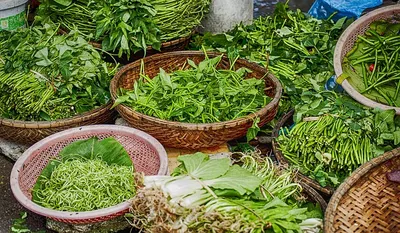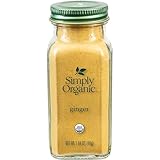Transform Your Health with These Powerful Kitchen Herbs and Spices
Key Points
- Spices are not only for flavor enhancement. These culinary wonders are not only great for flavor, but they also pack a powerful punch.
- Including a diverse range of spices in daily meals can improve nutrient absorption and act as natural bioenhancers, making your diet more effective.
- There’s a lot of scientific research supporting the health benefits of common kitchen spices. Spices such as turmeric, ginger, black pepper, cinnamon, and garlic each have tailored medicinal properties to help you.
- Organizing your spice collection transforms how you cook! Get creative with spices. There’s a way to add nutritional and functional value to every meal, regardless of cuisine.
- Regularly using spices in cooking can be a simple, enjoyable habit that promotes long-term health, but it is essential to be mindful of quantities and personal health needs.
- Consult with your doctor and dietitian before making any drastic changes to your spice intake. This is crucial to know—particularly if you have medical conditions or take medications—to use these spices safely and effectively.
- Ground Ginger – This high-quality organic ground ginger root adds a warm, slightly spicy kick with a zesty sweetness, perfect for enhancing both sweet and savory dishes.
- Ground Ginger – This high-quality organic ground ginger root adds a warm, slightly spicy kick with a zesty sweetness, perfect for enhancing both sweet and savory dishes.
- Best uses – Perfect for gingerbread cookies, stir-fries, smoothies, and teas, this versatile ground ginger brings vibrant flavor and warmth to a wide variety of recipes.
- Grown for something greater – Simply Organic works directly with sourcing partners whenever possible, paying fair prices directly to them, without a middleman, to maximize the grower’s return.
- Organic Bottled Spices – Elevate your dishes with Simply Organic Bottled Spices, where the pure, delicious flavor of our spices and seasonings bring the goodness of organics to everyday meals.
Last update on 2025-10-26 / Affiliate links / Images from Amazon Product Advertising API
Elevate your health with kitchen spices. Incorporate these easily accessible herbs and spices to experience their incredible health benefits.
Turmeric, cinnamon, and ginger spices work wonders to reduce inflammation, regulate blood sugar levels, and boost the immune system.
Hundreds of research papers have documented that these natural ingredients offer actual health benefits, ranging from improved digestion to reduced inflammation associated with arthritis.
A little pinch here or there in soups, teas, or salads can enhance the flavor while improving your health.
Many spices commonly found in our kitchens possess special properties that help protect the health of our hearts, brains, and digestive systems.
Once you learn which spices do what, it becomes simple to choose the best combination of spices for your specific needs.
The following sections discuss which spices are most effective and outline easy ways to incorporate them into your daily routine.
Spices: Tiny Giants of Wellness
Spices do much more than flavor up a dish — they subtly support your wellness, as well.
These little culinary powerhouses are loaded with vitamins, minerals, and antioxidants typically associated with fruits and vegetables.
Their widespread use around the world, in medicine and in everyday cooking, only further underscores their incredible importance to wellness.
By making some easy substitutions, you can bring a world of spices to your kitchen.
This not only intensifies the flavor but also introduces numerous healthy benefits!
Beyond Taste: A Health Revolution
Many spices go beyond flavor. Turmeric, for example, has curcumin, a compound linked to lower inflammation.
Ginger may soothe nausea, while cinnamon can help control blood sugar.
In some cultures, spices are a daily part of home remedies, used to alleviate issues such as bloating or mild colic. Adding spices can make it easier to enjoy healthy foods, helping you stick to a balanced diet.
Try using black pepper, cumin, or cardamom to change up your meals while reaping real health perks.
Why Your Pantry Holds Power
Your kitchen shelf can be a powerful wellness center.
6 spices to have on hand:
- Turmeric
- Cinnamon
- Ginger
- Black pepper
- Fennel seeds
- Cloves
These do more than add flavor, though; they can aid in lowering cholesterol and blood pressure, along with improving digestion.
In general, whole spices have a longer shelf life than their ground counterparts. For instance, fennel seeds last for three years when properly stored.
Keeping your spices organized will help you use them more frequently and incorporate them into everyday meals.
The Science of Spice Wellness
While the hype may not match reality, research supports a lot of what’s said about spices.
Antioxidants found in all spices play a role in preventing cell damage.
Research indicates that even the tiniest amounts—perhaps a pinch in a bowl of soup—can provide measurable benefits almost instantly.
Not all spices are created equal; the freshness of how they are stored is crucial.
Spices can lose potency or pick up off-flavors during processing. It’s true—even taking basic, easy steps to incorporate spices into your cooking is a savvy, natural move to boost your health!
- Simply Organic Starter Spice Gift Set
Last update on 2025-10-26 / Affiliate links / Images from Amazon Product Advertising API
Spices: Unlocking Nutrient Power

Spices do more than add taste; they can enhance healthy eating by helping your body absorb more nutrients from food.
Used for centuries, spices like turmeric, cumin, and cinnamon, along with flavorful additions like oregano and coriander, have played a role in both flavor and health, making a real difference in your diet.
The Bioenhancer Effect Explained
A Bioenhancer, simply put, is anything that aids your body in obtaining more nutrients from the food or medicine you consume. Some of the most popular ones—black pepper, turmeric, and ginger—are bioenhancers.
For instance, combining black pepper with turmeric significantly increases the absorption of curcumin, turmeric’s key active ingredient. These spices go to work through surprisingly simple mechanisms.
They slow the gut’s breakdown of food and change the cell walls in your intestines, allowing additional nutrients to enter.
Better Absorption, Better Health
Getting more from your food means better health. Poor nutrient absorption can lead to fatigue or illness.
Using spices as bioenhancers in your daily meals helps your body derive the most benefit from what you eat.
A simple lentil soup with cumin and turmeric not only tastes good but also helps your body use more iron and antioxidants.
Knowing how spices and nutrients interact can help you plan meals that work harder for your health.
Maximizing Your Meal’s Value
Black pepper, turmeric, ginger, cumin, cinnamon, rosemary. Use spices in stir-fries, soups, or roasted veggies.
Add them at the end of cooking to keep their strength.
Choose fresh or dried herbs for full flavor and health perks. Eat mindfully to notice how spices change your meal.
The Magic of Bioavailability
Bioavailability refers to the proportion of a nutrient that your body can absorb and use.
Spices enhance the bioavailability of minerals, such as iron, and vitamins, including vitamin B6.
Whether you cook it, what you mix it with, and your gut health play a role.
With spices, you can give your body the most with every single bite.
Your Spice Rack Pharmacy

Your spice rack can be a pharmacy, too. A spice rack can be more than an arsenal of flavor.
It’s a holistic approach that’s often the first step to better health, utilized long before modern pharmacies emerged.
Our most common kitchen spices can work wonders for our wellness, often in ways that extend far beyond flavor.
Because each spice has its unique series of strengths, regular use of each can be included in a comprehensive health plan.
1. Turmeric: The Golden Healer
Turmeric is particularly well-known for its anti-inflammatory and antioxidant properties, due mainly to the active compound curcumin.
New studies have linked curcumin to a reduced risk of developing chronic diseases, including heart disease and arthritis.
Turmeric is delicious in curries, golden milk, rice dishes, but also as a daily health tonic.
Whether in food or tea form, turmeric is beneficial.
2. Black Pepper: The Great Activator
Black pepper’s piperine assists the body’s absorption of nutrients, including curcumin from turmeric.
Piperine, which gives black pepper its bite, boasts anti-inflammatory and digestive benefits.
Freshly ground black pepper complements almost anything, and it enhances the effects of other spices. It’s an easy and delicious way to add it to vegetables or soups.
3. Ginger: Your Gut’s Best Friend
Ginger benefits your digestion and calms upset stomachs and nausea, as well as combating inflammation.
Ginger is delicious in stir-fries, smoothies, or tea and provides warming comfort.
Ginger is a popular remedy for soothing everyday tummy troubles.
4. Cinnamon: Sweet Health Support
Cinnamon promotes stable blood sugar levels and combats cell damage with antioxidants. It’s delicious in sweet and savory dishes alike, from breakfast oatmeal to caramelized root vegetables.
Daily use promotes optimal health in the long run.
5. Garlic: Nature’s Immune Booster
Garlic enhances the immune response to infectious agents and has direct antimicrobial actions. It is a powerful cold fighter and even fights parasites.
Add fresh garlic to sauces, soups, and dressings to boost flavor and wellness.
- Spices based on avaliability.
Last update on 2025-10-26 / Affiliate links / Images from Amazon Product Advertising API
Spice Up Your Daily Diet

Spices are a great way to add flavor to your everyday diet, offering new and exciting flavors to keep meals interesting.
They give your health an extra kick, too! Spices—like ginger and turmeric—were sought after for culinary purposes and their medicinal properties as well.
They can easily be incorporated into any dish and pair well with almost every cuisine, from Indian to Middle Eastern.
Make them a quick, healthy at-home meal! Experimenting with different spices makes food exciting and helps you pack in more nutrients and variety.
Simple Steps to Add Spice
Take baby steps. Start with one new spice per week and figure out what you like! Experiment.
Taste each spice and try blending them, but limit yourself to three to five spices when experimenting.
Too much and you’ll muddy the flavor. Cooking with whole spices is a game changer! Give them some time with your ingredients, preferably thirty minutes or so, to allow the flavors to soak in, especially with meats.
Fresh herbs and spices are generally higher in nutrients than their dried counterparts, so use them when possible.
Consider creating a spice journal, where you can write down new blends and spiced recipes that you find successful.
- Sprinkle cinnamon on oats or yogurt.
- Add turmeric to rice or stir-fries.
- Mix cumin with roasted vegetables.
- Use cayenne in fresh juice for a kick.
- Try fresh herbs in salads or soups.
Spice Ideas for Every Meal
- Breakfast: Cardamom in smoothies, cinnamon in porridge, nutmeg on toast.
- Lunch: Cumin in salads, smoked paprika in sandwiches, dill in soups.
- Dinner: Curry powder in stews, ginger in stir-fries, oregano on grilled foods.
- Snacks & Drinks: Mint in water, mint tea, mint ice cream, cayenne in juice. Try sprinkling black pepper on fruit.
Meal prepping with spice blends, including diverse herbs like oregano and coriander, will make your life easier and meals more interesting.
Making Spices a Daily Habit
Use timers to remind yourself to add variety while cooking. Create a plan for the week to use a different spice on each dish.
Teach your family or share a recipe with your friends to discover new ways of thinking.
We know that regularly incorporating spices can contribute to overall better digestion, lower inflammation, and happier meals.
Flavorful Recipes for Wellness
Enjoy lentil curry with turmeric, ginger tea, or roasted chickpeas with smoked paprika.
These flavorful recipes, featuring diverse herbs and aromatic spices, will spice up your wellness and daily life.
Old Traditions, New Science

For millennia, cultures around the globe have looked to kitchen spices for something beyond taste.
Ancient manuscripts such as India’s “Charaka Samhita” and the Chinese “Shennong Ben Cao Jing” provide remarkable information.
They showcase how our ancestors used spices as natural cures for centuries before the existence of modern science.
Now, science is starting to explain why these ancient practices are so effective. It demonstrates how they can be easily integrated into today’s health routines.
Spices in Traditional Medicine
Many regions, from South Asia to the Middle East, have a long history of using spices such as turmeric, ginger, and cumin for healing. In Ayurveda, turmeric is a go-to for joint pain and gut health.
Chinese medicine often utilizes cinnamon and star anise to warm the body and aid digestion.
These traditions are reflected in recipes—such as golden milk or spiced broths—where the primary goal was health, not just taste.
Today, keeping these old recipes alive helps us remember and use this knowledge in daily meals.
Science Backs Spice Benefits
Today’s studies are proving these ancient traditions to be true.
Research on turmeric’s active ingredient curcumin indicates it reduces cholesterol and promotes cardiovascular health.
Other spices, such as cinnamon, are associated with improved blood sugar management through increased insulin sensitivity.
Common healing herbs, such as rosemary, are rich in a wide array of antioxidants that can help strengthen the immune response.
Researchers continue to investigate the mechanisms underlying these compounds, and numerous recent discoveries support the claims of traditional healers.
Lessons from Global Kitchens
Spices are the stars of many international cuisines—from the Mediterranean to Southeast Asia—that create dishes with spices.
Although the Mediterranean diet is renowned for its generous use of herbs and spices, it is also associated with enhanced heart and gut health.
Whether it’s Moroccan tagines or Thai soups, sampling flavorful dishes from other cultures drives home the impact of a spice-rich diet.
It unlocks a world of flavor and tradition!
Future Spice Discoveries
The fascinating world of spices is continually expanding. Future scientific discoveries in spice medicine are not a new idea.
The art of combining spices for gut health is a trend that’s on the rise.
Natural remedies further expand on how to integrate these practices into everyday life!
As long as we remain open to new applications and combinations, we will continue to learn and discover innovative methods to maintain our health and wellness.
- Micro Ingredients offers high concentrated organic garlic powder. Culinary grade ingredients derived from freshly dried garlic bulbs. Pure savory and slightly sweet garlic flavor.
- 3lb bulk supply per pouch and offers 1,361 servings. A convenient non-GMO formula with every ¼ tsp equaling around one clove of fresh garlic from authentic Allium Sativum.
- Enjoy premium garlic that is enhanced with our aging process. Contained in dry and low temperatures over a long period of time to remove its pungent odor and any stomach irritating compounds while increasing overall bioavailability.
- A natural superfood herb that is full of antioxidants and rich flavor. Simply add it to any of your favorite sauces, seasonings, paste, butter, salads, or even veggies for a true garlic experience.
- Premium non-GMO and non-irradiated garlic powder. Made without soy, dairy, gluten, artificial colors, artificial flavors, and tree nuts. Ingredients must pass our 3rd party lab tests to ensure a product that is safe, pure, and potent.
Last update on 2025-10-26 / Affiliate links / Images from Amazon Product Advertising API
Spice Wisely: Key Considerations

Spices are powerful allies in the pursuit of flavor and wellness! To use them effectively, consider these essential factors.
Understanding how much is appropriate is key, particularly when some spices can be potent in small amounts.
Doing so will benefit your health, too.
Consult a physician or registered dietitian if you have any medical conditions or are taking any medications!
Balance and moderation are the foundation—using more spices doesn’t necessarily lead to greater benefits.
Culinary vs. Therapeutic Doses
There’s a big gap between using spices to flavor food and using them for health reasons.
For example, a sprinkle of turmeric or cumin in a curry adds an earthy base to the dish, but a “therapeutic” dose—like several grams per day—might be suggested for inflammation.
This higher intake should only happen with professional guidance, since more isn’t always safer.
Your goals matter: are you after just great flavor, or are you looking for a health boost? Always use caution when trying out larger doses.
Potential Spice-Medication Interactions
Some spices may interact with how certain medicines work. Turmeric and ginger, to name a couple, may increase bleeding risk if you’re on a blood thinner.
If you’re on medication, make an effort to monitor which spices you regularly consume and communicate openly with your physician.
Look up how spices interact with your medications before trying something new, as research shows that some can have substantial effects.
Smart Food and Spice Pairings
- Tomatoes + basil
- Chicken + paprika
- Lentils + cumin
- Fish + dill
- Rice + cardamom
- Smart pairing: Lamb + rosemary.
Experiencing foods enriched by unfamiliar spices introduces vibrant flavors and potential health benefits.
Regional cuisines—take Indian curries or Moroccan tagine, for example—utilize blends that complement flavors and play well within the dish.
Marinating meats with a 3:1 oil-to-acid ratio, along with fresh spices, allows flavors to infuse. Fresh and whole spices typically provide more flavor and nutrients than their dried or ground counterparts.
Listening to Your Body’s Response
Each person’s biological makeup is unique. Some people experience the positive health effects of spicy food, while others start to develop digestive discomfort.
Maintaining a simple food diary can help you identify where those patterns are.
Gradually increase your spice amounts and discover which spices work best for your unique body. The best plan is the one that’s right for you—listen to your body and go with what feels best.
Our Conclusion
Kitchen spices work hard for your health. Add turmeric to oats for a warm start.
Toss cumin in the soup for a bold flavor.
Mix cinnamon in yogurt for a sweet kick. Old cultures leaned on these spices for good reason.
Science backs them now.
Spices do not fix all, but with clever use, they can help you feel better. Each choice in your kitchen shapes your well-being.
Try one new spice this week. Notice the change in taste and mood.
Small steps add up fast.
Share your story with friends or family, or swap ideas for new blends.
Keep learning, stay curious, and let your spice rack push your health forward.
- Paprika – Made from organic red peppers, this pure, organic paprika is mildly tangy, warm with subtle notes of tomato and hints of sweetness. Add to a variety of dishes for a bright color and enticing aroma..
- Best uses – Try it in soups, mac and cheese, egg bakes, deviled eggs, potato salads and more. Excellent to enhance meats, vegetables and other side dishes.
- Grown for something greater – Simply Organic works directly with sourcing partners whenever possible, paying fair prices directly to them, without a middleman, to maximize the grower’s return.
- Organic Bottled Spices – Elevate your dishes with Simply Organic Bottled Spices, where the pure, delicious flavor of our spices and seasonings bring the goodness of organics to everyday meals.
- About us – We are Simply Organic. The original, all-organic spice brand that lives up to the promise of our name in all we cultivate and bring to the table.
Last update on 2025-10-26 / Affiliate links / Images from Amazon Product Advertising API
Frequently Asked Questions
How do spices improve overall health?
Kitchen spices, such as oregano and coriander, are full of powerful antioxidants and anti-inflammatory nutrients. Furthermore, these flavorful spices assist in the fight against inflammation, boost the immune system, and even help prevent chronic diseases. Incorporating these spices into your everyday cooking can naturally improve your health.
Which kitchen spices are the most beneficial for health?
Here are some of the most common healthy spices, including turmeric, ginger, and garlic, which are rich in antioxidant and anti-inflammatory properties. These culinary spices, such as black pepper and cinnamon, offer complex flavors that enhance nutrition and support healthy eating.
Can spices replace medicine for health issues?
While spices, such as oregano and cayenne pepper, can improve health, they should never replace prescribed medicine for severe health conditions. They’re not a panacea and should complement a healthy, balanced diet, including conscious recipes. Always consult a qualified healthcare practitioner before making any lifestyle changes.
How can I add more spices to my daily meals?
Begin by adding aromatic spices like oregano and coriander to roasted vegetables, soups, or grains. Incorporate them into your favorite marinades, teas, or salad dressings for a flavorful addition. The key is minor, frequent doses—spices are easy to integrate into nearly all meals.
Are there any side effects from consuming too many spices?
Taking excessive amounts of some culinary spices, such as cayenne pepper or oregano, may lead to stomach upset or even an allergic reaction. Generally, it’s best to utilize these flavorful spices in lesser amounts! Listen to your body’s response, especially if you suffer from allergies or underlying health conditions.
Do spices lose their health benefits over time?
To maintain the health benefits of culinary spices like oregano and coriander, store them in cool, dry places and use them within one to two years.
Is there scientific proof behind the health claims of spices?
No scientific proof behind the health claims of spices? Numerous scientific studies have proven the health benefits of turmeric, ginger, and garlic, as well as their role in dietary approaches that promote wellness and prevent diseases through various recipes.












